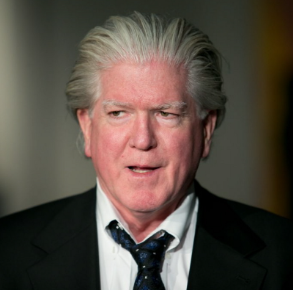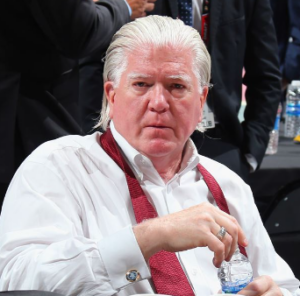Brian Burke’s suggestion to trade William Nylander over Mitch Marner has reignited debates about the best course of action for the Toronto Maple Leafs
With strong opinions on both sides, the team faces a challenging decision that will shape its future.
The passionate reactions from fans and analysts underscore the significance of this potential move and its implications for the Leafs’ success in the coming seasons.
Brian Burke’s criticism of the Maple Leafs’ reliance on their core four highlights a significant issue facing the team: the need for a balanced roster.
While the offensive talents of Matthews, Marner, Tavares, and Nylander are undeniable, hockey is a sport that requires contributions from all areas, including defense and goaltending.
As the Maple Leafs look to the future, finding a way to balance their star power with the overall needs of the team will be crucial for their success.
Whether this involves making trades, adjusting their financial strategy, or developing existing talent, the goal remains the same: to build a team capable of winning the Stanley Cup.

Also Read: Ranking the Top 5 NHL Father-Son Duos Drafted in the Top 15, Featuring Darryl and Ryan Sittler
Table of Contents
Brian Burke: Controversy Surrounding Comments on the Toronto Maple Leafs’ Trade Decisions
Brian Burke’s Bold Suggestion
Former Toronto Maple Leafs general manager Brian Burke has stirred up controversy with his suggestion that the team should prioritize trading William Nylander over Mitch Marner.1
This has sparked widespread debate among fans, analysts, and media, highlighting the complexities of managing a high-profile NHL team.
#CIBCMiracleDay does so much to help kids around the world see that there are no limits to ambition and what they can achieve https://t.co/5wB5c4Oemi
— Mitchell Marner (@Marner93) December 6, 2023
Burke’s Stance on Marner’s Value
On The Leafs Nation, Burke emphasized Marner’s value to the team despite the trade rumors that have circulated following the playoffs. He stated:
“Obviously, with no-trades and no-moves, you can really question the wisdom of all that, but it really is a case where you are going to have to convince one of these guys to get out,” Burke remarked. ”
I think the logical guy to move would be Willie Nylander and not Mitch Marner, I’ve said that before, but I think it might be Mitch Marner.”

The Case for Mitch Marner
Burke further elaborated on Marner’s importance to the team:
“Mitch Marner is a really important player on the team, he kills penalties, I know people are down on him right now, but he’s a great kid and an important player. They are both great players. I just think Mitch Marner is a much more valuable player to me.”
This endorsement of Marner underscores his multifaceted role within the team, from his defensive contributions to his leadership qualities on and off the ice.
Fans React to Burke’s Comments
Burke’s comments have not gone unnoticed by fans and analysts, many of whom took to social media platforms like X (formerly Twitter) to express their frustration and disbelief. Here are some of the reactions:
- “This is why he gets fired everywhere he goes.”
- “He’s wanted Nylander gone the day he got here.”
- “He’s always had a hard-on against Nylander.”
- “Glad he’s not our GM.”
- “That is why he is no longer in the NHL.”
- “Zero chance I’m listening to this shit.”
- “Burkie on the weed again.”
- “That’s reason enough to trade Marner.”
These reactions reflect a deep divide within the fanbase and an ongoing debate about the best strategic moves for the Leafs.

Mitch Marner: Contract
One of the significant challenges in trading either Marner or Nylander lies in their contract clauses.2
Marner, set to earn $10.9 million per season in the final year of his contract, and Nylander, in the first year of a $92 million deal, both possess no-movement clauses.
These clauses significantly limit potential trades unless either player agrees to waive them.
The financial landscape of the NHL adds another layer of complexity to the situation. With the league’s salary cap in place, teams must navigate their rosters and contracts meticulously.
Trading high-profile players like Marner or Nylander involves not just finding a suitable trade partner but also ensuring the financials align.
Marner’s On-Ice Contributions
Mitch Marner’s contributions to the Leafs extend beyond his offensive production. Known for his penalty-killing abilities and defensive reliability, Marner is often seen as a cornerstone of the team’s success.
His ability to play in various situations makes him a versatile asset that many believe is irreplaceable.
William Nylander, on the other hand, is celebrated for his offensive skills. His scoring ability and playmaking have been pivotal for the Leafs, making him a fan favorite. However, his perceived lack of consistency has been a point of contention among some analysts and fans.
The Trade Market
The trade market for NHL players is highly competitive and often unpredictable. Teams looking to acquire players like Marner or Nylander must offer substantial assets in return, which complicates potential trades.
The value assessment of these players can vary significantly from team to team.
Brian Burke’s history with the Toronto Maple Leafs adds context to his comments. Known for his outspoken nature and willingness to make bold moves, Burke’s tenure with the Leafs was marked by significant trades and roster overhauls.
His perspective on the current situation is shaped by his experiences and the strategies he employed during his time as GM.

Brian Burke’s Critique of the Maple Leafs’ Core Four
In the world of hockey, the composition of a team’s roster is often the subject of intense debate.3
One such debate has been fueled by Brian Burke, a former NHL executive known for his candid opinions. Burke has been openly critical of the Toronto Maple Leafs’ strategy of relying heavily on their “core four” players: Mitch Marner, William Nylander, John Tavares, and Auston Matthews.
All four of these players are set to earn over $10 million each in the upcoming season, a financial strategy that Burke argues is unsustainable without addressing the team’s defensive and goaltending needs.
The Core Four: Strengths and Limitations
The “core four” of the Maple Leafs have undeniably impressive offensive skills. Auston Matthews, known for his scoring prowess, is a centerpiece of the team’s attack.
John Tavares brings veteran leadership and consistency. Mitch Marner is renowned for his playmaking abilities, while William Nylander adds speed and versatility.
However, Burke’s criticism lies in the similarity of their skill sets and the disproportionate allocation of the team’s salary cap to forwards. This, he believes, leaves the team vulnerable in other crucial areas.
View this post on Instagram
Financial Implications and Team Balance
Burke’s main contention is that allocating such a significant portion of the salary cap to four forwards is not a sustainable model for success.
He argues that this financial strategy leaves little room to build a robust defensive lineup or to invest in high-caliber goaltending.
The NHL is a league where balance is key; successful teams often have a well-rounded roster with strengths in both offense and defense, as well as reliable goaltending.
The Need for Defensive and Goaltending Improvements
For the Maple Leafs, improving their defensive and goaltending capabilities is crucial. In recent seasons, the team has struggled in these areas, particularly in the playoffs where defensive lapses and inconsistent goaltending have cost them dearly.
Burke believes that without addressing these weaknesses, the team will continue to fall short of their championship aspirations.
Burke’s Call for Reevaluation
Burke’s critique is not just about the financial aspect; it’s also about the need for a strategic reevaluation of the team’s composition.
He supports the idea of making changes to the roster, even if it means parting with one of the core four, to achieve a more balanced team.
This sentiment is echoed by many fans who are frustrated with the team’s repeated early exits from the playoffs.

Maple Leafs: Potential Changes and Strategies
Looking ahead, the Maple Leafs have several options to consider. They could trade one of the core four to free up salary cap space and acquire defensive or goaltending assets.
Alternatively, they could focus on developing their existing defensive prospects and hope that their current goaltending situation stabilizes.
Balancing Star Power with Team Needs
One of the challenges for the Maple Leafs’ management will be balancing the star power of their core four with the overall needs of the team.
Stars like Matthews, Marner, Tavares, and Nylander draw fans and generate excitement, but hockey is a team sport that requires contributions from all areas. Achieving this balance will be critical for the team’s long-term success.
Fan Sentiment and Expectations
The sentiment among Maple Leafs fans is a mix of frustration and hope.
There is frustration with the team’s inability to advance past the early rounds of the playoffs, but there is also hope that with the right changes, the team can finally reach its potential.
Burke’s critique resonates with many fans who believe that a more balanced roster is the key to breaking the cycle of playoff disappointments.
Burke’s Track Record and Influence
- Brian Burke’s opinions carry weight not just because of his experience in the NHL, but also because of his track record.
- He has been involved in the management of several successful teams and his insights into team building are respected.
- His criticism of the Maple Leafs’ strategy is therefore not just an outsider’s opinion, but a seasoned perspective on what it takes to build a championship-caliber team.
- If the Maple Leafs decide to heed Burke’s advice and trade one of their core four, several scenarios could play out.
- Trading a player like Nylander or Marner could bring in high-quality defensive or goaltending assets.
- However, any trade involving a core player would need to be carefully considered to ensure that it improves the team’s balance without sacrificing too much of their offensive firepower.
Also Read: Brian Burke (Ice Hockey): Bio, Wiki, Age, Career, Family, Controversy, PWHLPA and More




